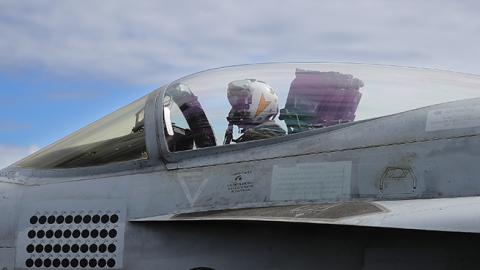At the heart of national-security strategy is imagination. The strategist’s job is to dream up what enemies someday might do to harm us. But there’s a lot of history supporting the adage that generals forever prepare to fight the last war. After World War I, France fortified itself against a German invasion of the kind it had spent four years stalemating in the trenches. After Sept. 11, 2001, the new Transportation Security Administration focused on airport procedures to prevent a repeat of that attack.
The problem of dangers’ being unimaginable was front and center for the bipartisan National Defense Strategy Commission. Congress created the commission of national-security experts in December 2016. Its report, released last month, conjured up realistic near-term scenarios to show how the U.S., as a result of military deficiencies, might acquiesce to enemy aggression or accept defeat in battle.
Here’s one of the report’s scenarios:
bq(blockquote). Responding to false reports of atrocities against Russian populations in Latvia, Lithuania, and Estonia, Russia invades those countries under guise of a ‘peacekeeping’ mission. . . . Russia declares that strikes against Russian forces in those states will be treated as attacks on Russia itself—implying a potential nuclear response. Meanwhile, to keep America off balance . . . Russian submarines attack trans-Atlantic fiber optic cables. Russian hackers shut down power grids and compromise the security of U.S. banks. The Russian military uses advanced anti-satellite capabilities to damage or destroy U.S. military and commercial satellites. Major [American] cities are paralyzed; use of the internet and smart phones is disrupted. Financial markets plummet. . . . The banking system is thrown into chaos. Even as the U.S. military confronts the immense operational challenge of liberating the Baltic states, American society is suffering the devastating impact of modern conflict.
Unless one is blessed with stupid enemies—and you can’t count on that—the proper assumption is that they are innovating. For World War II, the Nazis invented blitzkrieg, which worked stunningly at the outset and made France’s static fortifications ineffective. Before 1973, intelligence leaders in Jerusalem didn’t imagine that Egypt, without being able to destroy Israel’s army, would launch a surprise attack to seize the Suez Canal. It’s hard to dream up the unprecedented, and even harder to persuade large bureaucracies to heed unfamiliar dangers.
The imagination problem favors aggressive states because they apply themselves to the task of strategizing creatively to win their aims. Status-quo powers, like the U.S. now, commonly prioritize nonmilitary spending and believe the world is more stable than it is. They must anticipate the full range of enemy actions even as their officials don’t devote real energy or resources to the task of countering possible threats. In neither Congress nor the White House has there been a vivid enough appreciation of how America’s various enemies can take advantage of its vulnerabilities.
Americans seem generally complacent about the dominance of their armed forces. There is little understanding of the risk that the U.S. could lose a war against China in the South China Sea or that Russian President Vladimir Putin might deter the U.S. from resisting his aggression against our allies in Europe. American military failure could change the world in ways that, for many Americans, are unimaginable.
The National Defense Strategy Commission concluded that the U.S. is now in a “crisis of national security.” Due to “political dysfunction” and bad budget decisions by both political parties, “America has significantly weakened its own defense.” As a result, “the security and wellbeing of the U.S. are at greater risk than at any time in decades.” U.S. defenses are weakening due to insufficient funding as the power of America’s enemies is growing. These developments are “undermining deterrence of U.S. adversaries and the confidence of American allies, thus increasing the likelihood of military conflict.”
Given America’s decades of military predominance since World War II, imagination is required to comprehend that it could lose that position. The result could be not just a faraway military defeat but also economic and political decline. A U.S. military rout at the hands of a rising China, for example, could end U.S. alliances in Asia (and perhaps Europe too), with demoralizing and destructive effects at home. No one should assume that our constitutional system would survive a world where hostile powers dominate the world stage.
That is awful to say. It’s hard to imagine. But it’s crucial to imagine if Americans are going to support the appropriations and reforms needed from Congress and the president to remedy our defense deficiencies. These include, according to the commission, a larger conventional force, better ways to tap innovative technologies, making defense purchases less cumbersome and less risk-averse and modernizing the severely aging U.S. nuclear capability. The commission also stresses shortcomings in U.S. efforts to bolster anti-cyberwarfare capabilities, missile defense and space assets.
The commission’s report is sober but alarming. The president is reportedly coming around to the view that the country needs a larger defense appropriation. Will members of Congress have the imagination to be properly alarmed and the good sense to approve the funds?


















